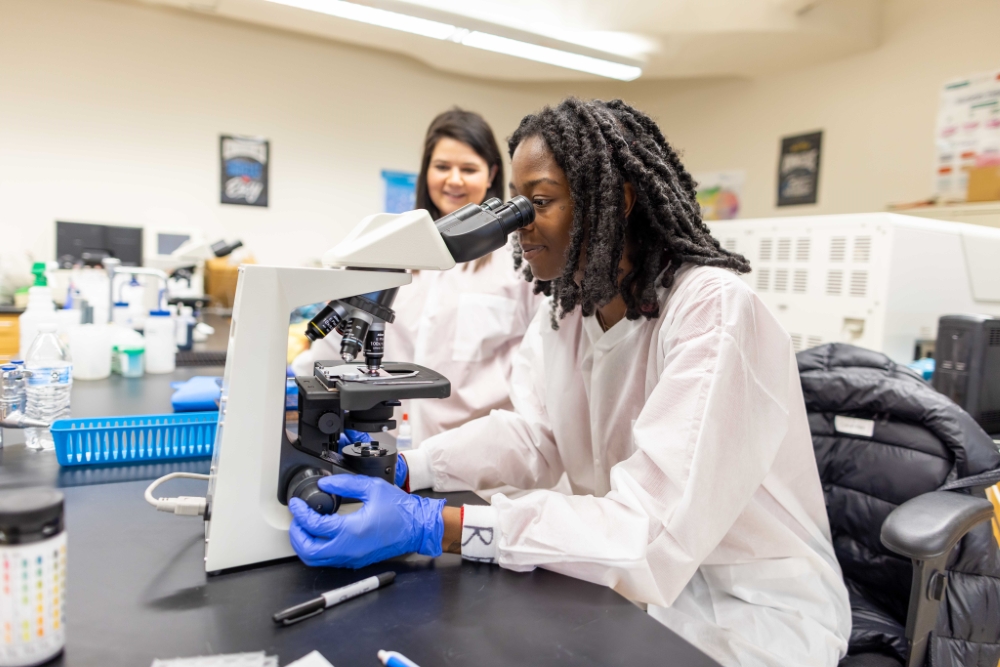How academic institutions keep Kentucky-based companies competitive.
In Kentucky, colleges and universities are some of the most valuable allies for businesses, offering a range of resources that help companies stay ahead in an ever-evolving market.
This support starts at the 16 colleges and 70 campuses associated with the Kentucky Community and Technical College System (KCTCS). With nearly 100,000 students enrolling each year in more than 600 programs, ranging from associate degrees to industry-recognized credentials, KCTCS ensures Kentucky’s workforce remains skilled, adaptable and ready to meet the demands of businesses across the state.
To do this effectively and efficiently, KCTCS partners with over 3,000 businesses throughout Kentucky, allowing their industry expertise to influence the curriculum and open doors for its students.
“We want to make sure we have industries dialed into what our programs are offering,” said Blair Hess, vice president of communications and marketing at KCTCS. “We do regular reviews of all our workforce programs with those industries. Say it’s a welding program: We have welders sitting on those review committees so that they can tell us, ‘Yes, this training is still relevant. No, we require new technologies.’ We are focusing on putting students to work no matter what their program is.”
Hess emphasized that KCTCS’ programs are not only for people looking for new certifications or degrees. Through the KCTCS-TRAINS program, a fund designated by the Kentucky General Assembly, companies are able to upskill their workforce. Those that are eligible will receive funding to assist with the cost of providing training and assessment services to current and potential employees through KCTCS colleges.
“We will cover up to 75% of the cost of upskilling your workforce and teach them the new technology,”explained Hess. “So, if something has changed in your industry, and you suddenly have a workforce that needs new training, come to KCTCS.”
KCTCS-TRAINS funds are distributed on a project-by-project basis and require a company cash match of 25% plus a 10% administrative fee for use of the funds.
Partnerships in Action
Elizabethtown Community and Technical College (ECTC), a KCTCS-affiliated school, has been instrumental in preparing the thousands of workers needed to get Ford and SK On’s BlueOval SK Battery Park up and running.
In June 2024, the ECTC BlueOval SK Training Center, a 42,000-sq.-ft. facility designed specifically to train workers for the 5,000 jobs created at the new battery park, kickstarted onboarding classes for more than 700 employees of varying experience levels.
The core curriculum focuses on battery knowledge, roles and skills, with employees also receiving specialized training in SK On’s proprietary technical, quality and manufacturing processes. The Center was specifically outfitted with virtual reality labs, an industrial maintenance lab, work simulation labs and classrooms dedicated to ergonomics techniques to give students hands-on learning experiences on advanced equipment.
“One of the main vertebrae in the spine of our community is our friends at KCTCS and ECTC,” said Elizabethtown Mayor Jeff Gregory in a press release last May. “This region owes much of our success in regard to industrial recruitment to our community and technical college’s ability to adapt curriculum to the needs of our industrial clients. The new ECTC BlueOval SK Training Center is further proof that private and public can collaborate to benefit the citizens of this region and the commonwealth of Kentucky for the foreseeable future.”
An Engine for Advancement
Workforce training isn’t the only way Kentucky’ s higher education system is supporting industry. Major research institutions such as the University of Kentucky (UK) and the University of Louisville (UofL), drive innovation and economic growth through cutting-edge research in fields such as health care, agriculture and engineering. UK’s Kentucky Innovation Center and UofL’s focus on bioengineering and data science help translate discoveries into real-world applications, while fostering partnerships with businesses and startups. Together, they strengthen Kentucky’s industrial competitiveness and position the state as a leader in research and development.
In recent years, the innovation landscape in Kentucky has grown to extend beyond R1 universities, opening more opportunities for collaboration and progress. Through Kentucky Commercialization Ventures (KCV), smaller colleges and universities’ contributions to the state’s research-driven economic growth are expanding.
“We do not have to be Silicon Valley. We do not have to be Boston or New York City. We have a special power in our own right by being from Kentucky and having the landscape and the profile that we do,”
—Kayla Meisner, Executive Director of KCV
The venture is led by a board of advisors including representatives of the Kentucky Science and Technology Corporation (KSTC), Kentucky Cabinet for Economic Development, the Kentucky Council on Postsecondary Education, the University of Kentucky and the University of Louisville. KCV serves as a resource for non-R1 universities and colleges to bolster research, product creation and commercialization.
KCTCS, Eastern Kentucky University, Kentucky State University, Morehead State University, Murray State University, Northern Kentucky University and Western Kentucky University are among those benefiting from KCV initiatives.
“I like to say we’re a disruptor in the space of academic research and development, because we produce a statewide resource for people that had otherwise never had it,” said Kayla Meisner, executive director of KCV. “Our schools are not going to have schools of medicine or a cancer center like UofL or UK might have, but what we do have is these socially impact-driven solutions that I believe may arrive to the market quicker. And that’s really exciting that we may be able to see a flurry of companies coming out of rural Kentucky solving big, impactful issues in a new way and with a new perspective.”
It accomplishes the first goal through the KCV Innovation Fellowship, a cohort-based training program designed to “demystify the world of commercialization” for aspiring innovators. This cohort-based, 8-week program walks participants through every step of the commercialization process, from ideation to market entry. Weekly online cohort meetings, combined with independent study using high-quality startup training materials, guided application exercises and mentoring sessions with KCV staff and coaches, ensure that participants gain a comprehensive understanding of how to turn their research into a viable business.
In addition to training, KCV also focuses on providing financial resources to support innovation at various stages. Through initiatives like the KCV Impact Competition, this seed fund is directly supporting the research and development of early-stage ideas.
The KCV GOAL (Growth, Opportunity, and Learning) fund provides financing for professional development opportunities for faculty, staff and students. This fund enables participants to present their research and entrepreneurial efforts at conferences and other events by covering related expenses, helping them gain visibility and foster connections.
Granting Emerging and Developing Institutions a Competitive EDGE (Equitable and Diverse Grant Ecosystem), also known as KCV EDGE, received the organization’s first National Science Foundation (NSF) grant, totaling $8.25 million, in 2024. This program builds on KCV’s centralized technology transfer services for public colleges and universities as it strives to support underrepresented higher education institutions with research infrastructure.
Your Ideas Are Yours to Keep
Just as the innovations KCV supports aim to empower ideas that impact lives, the alliance itself is dedicated to creating enduring change through its advocacy efforts.
The Kentucky Intellectual Propety Alliance promotes education and awareness related to the protection of intellectual property, playing a critical role in shaping a favorable environment for innovators in the state. Kentucky was the fifth state in the U.S. to launch an IP Alliance.

KCTCS offers more than 600 degree and certification programs essential to industries such as health care and manufacturing.
Image courtesy of KCTCS
This advocacy work is reflected in how KCV runs its own programs. The organization does not take any ownership of its participants’ intellectual property.
“We do not take an assignment of anyone’s intellectual property,” said Meisner. “We foot the bill, and we pay for the protection, and we advise on the protection needed for that innovation and then we try to move them along that commercialization pathway, which at every stage is attempting to derisk the technology and maximize the value.”
By nurturing the growth of new technologies, fostering entrepreneurship and advocating for strong intellectual property protections, KCV is not only driving economic development but also improving the lives of those living in Kentucky.
“We do not have to be Silicon Valley. We do not have to be Boston or New York City. We have a special power in our own right by being from Kentucky and having the landscape and the profile that we do,” said Meisner. “I believe that the people that we get to work with, the researchers, the administrators, the innovations that we see coming out of our KCV partner institutions will be the solution.”

